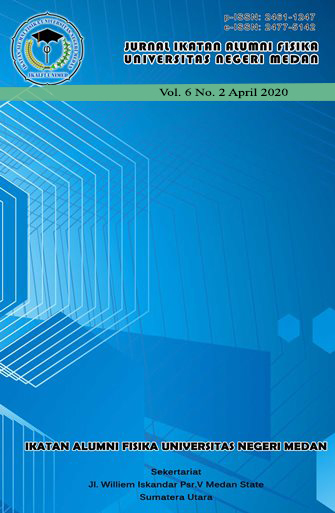PENGARUH MODEL PEMBELAJARAN INQUIRY TRAINING BERBANTU ALGODOO TERHADAP KETERAMPILAN PROSES SAINS DI SMA NEGERI 1 RANTAU UTARA
DOI:
https://doi.org/10.24114/jiaf.v6i2.18563Keywords:
Model Pembelajaran, Inquiry Training Berbantu Algodoo, Keterampilan Proses Sains.Abstract
Abstrak. Penelitian ini bertujuan untuk mengetahui pengaruh akibat penggunaan model pembelajaran inquiry training berbantu algodoo terhadap keterampilan proses sains di kelas X Semester II SMA Negeri 1 Rantau Utara. Jenis penelitian ini quasi eksperimen dengan desain penelitian control group pretest-posttets design. Sampel dilakukan dengan teknik cluster random sampling sebanyak dua kelas. Hasil penelitian dari uji t dua pihak (pretes) menunjukkan nilai thitung = 1,489 dan ttabel = 1,998 maka thitung<ttabelyang berarti kedua kelas memiliki kemampuan awal yang sama.Untuk nilai dari uji t satu pihak (postes) menunjukkan nilai thitung = 3,881 dan ttabel = 1,669 maka thitung> ttabel yang berarti keterampilan proses sains siswa yang menggunakan model pembelajaran inquiry training berbantu algodoo lebih baik dari pada pembelajaran konvensional.Abstract. This study aims to determine the effect due to the use of inquiry learning training model of algodoo assisted science process skills in classX SMA N 1Rantau Utara. This research is a quasi-experimental study with the design of control group pretest-posttest research design. Sample selection is using cluster random sampling technique in as many as two classes.The results of the two-party t-test (pretest) showed a value of tcount= 1,489 and ttable = 1,998, then tcount< ttable, which means two classes have the same initial ability. And the result of the one-party t test (posttest), it shows the value of tcount = 3,881 and ttable = 1.669, then tcount> ttable which means science process skills students who use the inquiry learning model algodoo assisted training are better than conventional learning.References
Aminah, S., & Derlina., (2015), Efek Model Pembelajaran Inquiry Training dan Kemampuan Berfikir Logis Terhadap Keterampilan Proses Sains Siswa, Jurnal Pendidikan Fisika, 4 (2) : 63-68
Aminah, T, & Mukti, (2017), Pengaruh Model Pembelajaran Inquiry Ttaining Berbantuan Animasi terhadap Hasil Belajar Siswa SMA, Jurnal Ikatan Alumni Fisika Unimed, 3 (2) : 75-81
Hutahaean, J., & Atikah PL., (2016), Pengaruh Model Pembelajaran Inquiry Training Terhadap Hasil Belajar Siswa pada Materi Pokok Fluida Statis Kelas X Semester II di SMA Negeri 1 Stabat T.P. 2015/2016, Jurnal Ikatan Alumni Fisika Universitas Negeri Medan, 2 (2) : 19-24Joyce, B., Marsha W., & Emily C., (2016), Model-Model Pengajaran Edisi Kedelapan (Achmad F & Ateilla M, Penerjemah), Pustaka Pelajar, Yogyakarta
Murtiningsih, E., & Alkhafi MS., (2016), Pengaruh Model Inquiry Training Terhadap Keterampilan Proses Sains Siswa SMA, Jurnal Ikatan Alumni Fisika Universitas Negeri Medan, 2 (6) : 1-7Rao, B., & Uyyala N., (2008), Science Proccess Skills of School Students, Discovery Publishing House, New Delhi
Sadiman., (2009). Media Pendidikan, Pengertian, Pengembangan, dan Pemanfaatannya. Rajawali Press , Jakarta
Sakdiah, H, & Sahyar, (2014), Efek Model Pembelajaran Inquiry Training Berbantukan Handout Dan Sikap Ilmiah Terhadap Kemampuan Siswa Berbasis Keterampilan Proses Sains, Jurnal Pedndidikan Fisika, 5 (2) : 33-39)
Sipapaga, DS., & Ida Wahyuni., (2015), Pengaruh Model Pembelajaran Inquiry Training Terhadap Hasil Belajar Siswa Pada Materi Pokok Listrik Dinamis, Jurnal Inpafi, 3 (4) : 20-16
Sudjana, (2005), Metoda Statistika, Penerbit Tarsito, Bandung
Tanjung., (2013), Evaluasi Hasil Belajar Fisika, Unimed Press, Medan
Trianto., (2009), Mendesain Model Pembelajaran Inovatif-Progresif, Penerbit Kencana Prenada Media, Jakarta
Downloads
Published
Issue
Section
License
Copyright (c) 2020 JURNAL IKATAN ALUMNI FISIKA UNIVERSITAS NEGERI MEDAN

This work is licensed under a Creative Commons Attribution 4.0 International License.
Authors who publish with this journal agree to the following terms:- Authors retain copyright and grant the journal right of first publication with the work simultaneously licensed under a Creative Commons Attribution License that allows others to share the work with an acknowledgement of the work's authorship and initial publication in this journal.
- Authors are able to enter into separate, additional contractual arrangements for the non-exclusive distribution of the journal's published version of the work (e.g., post it to an institutional repository or publish it in a book), with an acknowledgement of its initial publication in this journal.
- Authors are permitted and encouraged to post their work online (e.g., in institutional repositories or on their website) prior to and during the submission process, as it can lead to productive exchanges, as well as earlier and greater citation of published work (See The Effect of Open Access).

